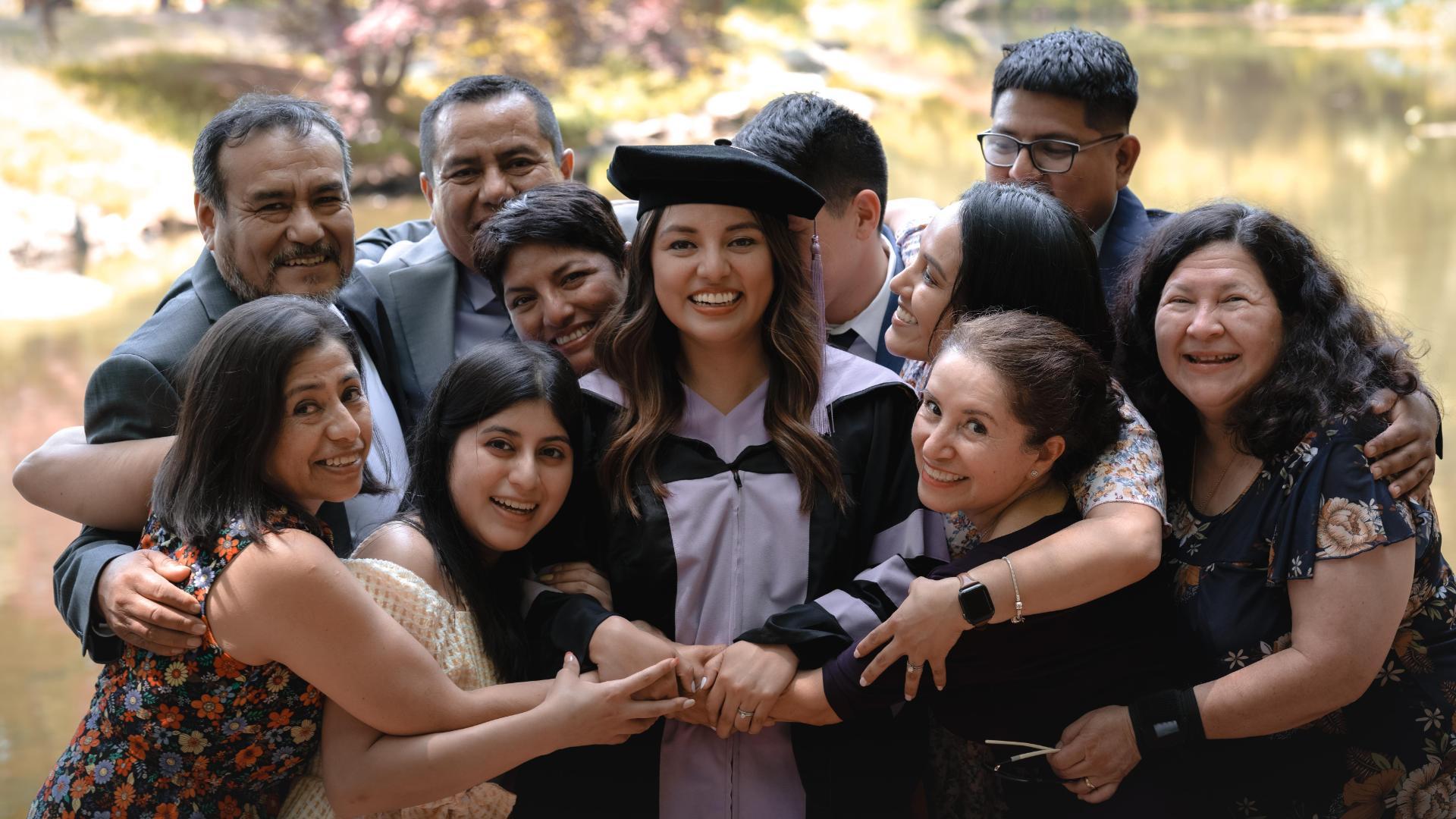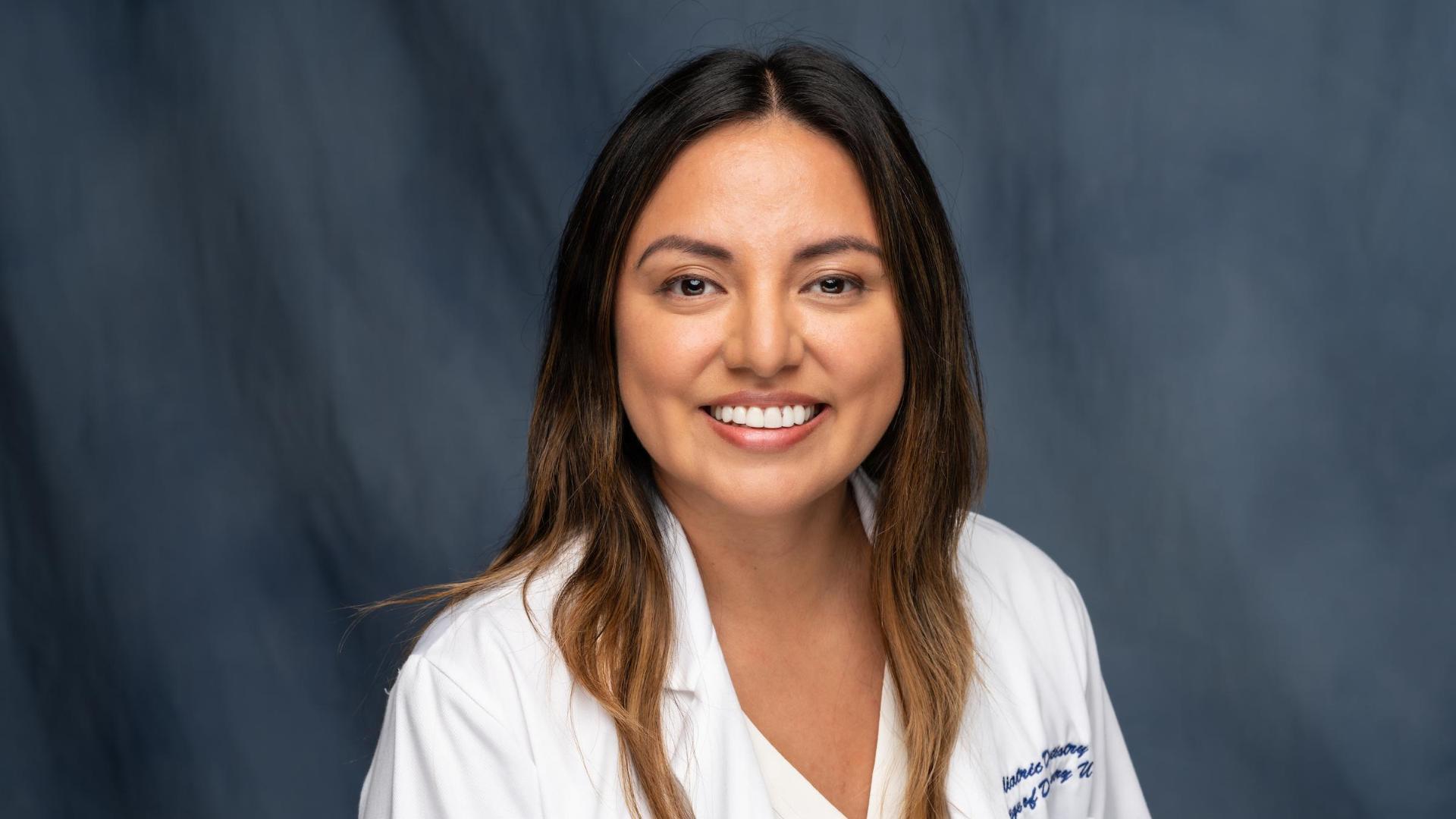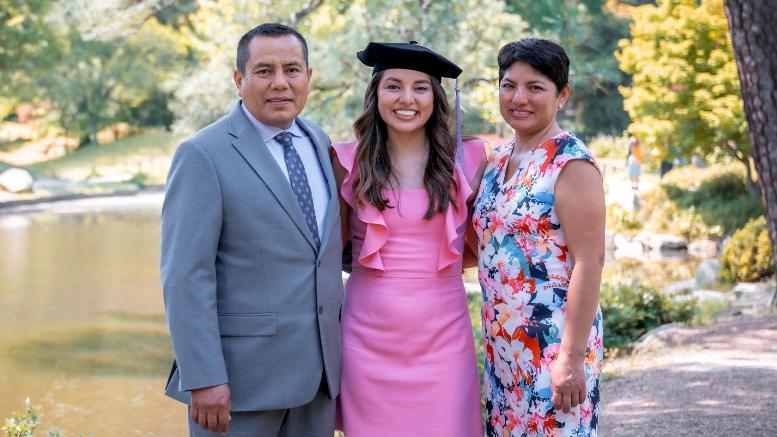 Dr. Laura Choque and family celebrate her graduation from VCU School of Dentistry.
Dr. Laura Choque and family celebrate her graduation from VCU School of Dentistry.Dreamer to dentist: VCU School of Dentistry alum defies odds to make her dreams a reality
With inspiring resolve, a recent VCU School of Dentistry graduate navigated a challenging path to make her dreams come true.
Making it to dental school is tough. Making it through dental school is even harder. A Dreamer graduating from dental school is truly defying the odds.
This past May, Laura Choque earned her Doctor of Dental Surgery degree from VCU School of Dentistry, but she started her dentistry journey as a undocumented immigrant. At the age of nine-years-old, Choque and her family came to the United States with a dream. A dream of freedom and the opportunity of a better life.
“My parents always believed in education so we came here for a better opportunity, something that we didn't have in Peru. We lived in a really poor area where we didn't have access to medical or dental care,” Choque said. “That is what pushed me to pursue higher education, not just for myself, but for my family and for all the sacrifices that they made to come to this country.”
Originally named from the Dream Act (Development, Relief and Education for Alien Minors Act), a federal legislative proposal that never became law, the term “Dreamer” is used to describe young undocumented immigrants who were brought to the United States as children and have big dreams for a better future.
For Choque, and thousands of other undocumented students, the path to higher education is an extremely difficult one due to many legal and financial barriers. While Federal law doesn't prohibit undocumented students from attending college, challenges and obstacles associated with their legal status might discourage even the most resilient students.
A huge turning point came in 2012 when President Barack Obama established the Deferred Action for Childhood Arrivals (DACA) program through an executive action. The program provides undocumented young people temporary relief from deportation and a renewable temporary work authorization.
“I could finally stop living in the shadows and breathe. I didn’t have to worry about being deported and ripped away from my family,” Choque said. “Honestly, I was able to have an educational future through that program. If I didn't have that, I don't know where I would be.”

Through DACA, Choque gained access to in-state tuition and scholarships, which was crucial since she did not qualify for federal financial aid, meaning she could not apply for federal loans, grants or scholarships.
Working full time as a dental assistant in Maryland, Choque attended community college at Montgomery College and then the University of Maryland, where she graduated with a degree in neurobiology and physiology.
During that time, Choque also grew her passion for dentistry and began taking steps to apply for dental school.
“I knew I wanted to go to dental school because I loved the profession. I loved the difference that it made and I wanted to use my background to help patients from underserved communities, similar to the community that I was raised in,” Choque said.
While Choque knew she wanted to apply for dental school, she wanted to make sure she was a strong applicant.
“For me, I only had one shot to do this,” she added. “I couldn't afford to do this twice. Applying to dental school is very expensive.”
Choque decided to strengthen her application by applying for a post-baccalaureate program at UCLA. Not only was she one of just two students accepted, her tuition was covered and she received a stipend for living expenses.
Now, she was ready to apply to dental school, a journey that turned out to be her most difficult undertaking yet.
“Applying to dental school was extremely difficult and at times felt hopeless,” Choque said.
While attending an American Dental Education Association conference, she had the opportunity to talk to representatives from dozens of dental schools.
“It was eye-opening to see how many people didn’t know what DACA was,” Choque said, noting that one school even told her not to apply because of her legal status.
“They weren't looking at me as a person, but more of a liability. That was very discouraging. When I was at that conference, I felt really defeated,” Choque said. “I felt very anxious because dental school had always been my dream. I am the kind of person, when I put my mind to it, I will make it happen no matter what. But at that point, I felt like there were things that were out of my hands, things I couldn't control.”
However, Choque says she was given renewed hope when she stopped at the VCU School of Dentistry booth. Choque spoke with Susie Goolsby D.D.S., M.S.H.A., who then was the school’s director of student recruitment and pathway programs.
“She was very understanding. She knew exactly what DACA was. She encouraged me to apply. So that was really encouraging to hear,” Choque said. “I felt like all my hard work was for nothing, but she gave me hope that my chances would be based on merits compared to other students and not because of my legal status.”
“VCU was one of the few schools that noticed me, not for my legal status, but for who I was as a person. That’s why I applied,” Choque added.
Choque was offered a spot as a D.5 candidate, which is for applicants who show great potential toward being a dentist, but were not successful in gaining admission. Students must take several science courses and prove their ability to succeed in professional school courses.
“It was a blessing in disguise. It was an extra year of school, but that actually helped me a lot because I still couldn't apply for a loan. I still couldn't get federal help,” Choque said.
After having a successful D.5 year, Choque was accepted into the Doctor of Dental Surgery program at VCU School of Dentistry. Her next step was figuring out how to pay for dental school without the ability to take out federal loans.
With the help of VCU School of Dentistry’s Office of Financial Aid, she was able to obtain a private bank loan to help finance her first two years. Choque says VCU School of Dentistry’s support system really helped her navigate, not only the stresses of dental school, but all the stresses and obstacles that came along with her legal status as a DACA recipient.
Choque also had high praise for former Senior Associate Dean of Student Services Michael Healy, D.D.S., M.Ed., who she said played an integral role in her time at VCU.
“I love that man (Healy). He was my support system there. He knew my situation and he did everything he could to help me, and that just meant so much to me,” she explained.
After years of roadblocks and challenges due to her legal status, Choque received her green card and officially became a permanent resident of the United States during her second year of dental school. She could then apply for federal loans and finish her last two years of dental school without the burden of how she was going to pay, how her legal status was going to affect her ability to continue her education and if she would ultimately reach her dream of becoming a dentist.

That dream was realized on May 12, 2023, when Choque received her doctoral hood and officially graduated from VCU School of Dentistry.
“Every time I thought about giving up or not being perfect enough, I just thought of my parents and all the sacrifices that they made,” Choque said. “I thought of all the support from my family, friends, husband and the faculty and staff at VCU School of Dentistry. I always felt that support and it motivated me to keep going.”
Choque is now a pediatric dental resident at the University of Florida and is working on a research project with Dina Garcia, Ph.D., an assistant professor in the VCU School of Medicine, examining the relationships between immigration policy, legal vulnerability, and oral health outcomes among Latino adults.
Choque hopes her relentless pursuit of her dream inspires other undocumented youth who face similar struggles and obstacles.